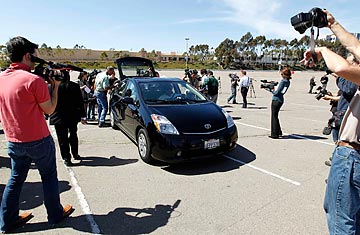
A 2008 Toyota Prius in a parking lot, after the automaker announced preliminary findings in its investigation of an unintended-acceleration incident
(2 of 2)
Michels, however, claimed that the media accounts of the event basically blew the incident out of proportion. "Clearly there has been an unfortunate rush to judgment," he said.
Separately, Orange County District Attorney Tony Rackauckas filed a civil lawsuit charging Toyota with unfair business practices — knowingly selling defective vehicles and failing to disclose them to California residents. Toyota declined to comment on the suit.
Despite preliminary findings that Toyota's software did not play a role in the Prius acceleration, suspicion will likely linger as long as no other cause is positively identified. To put suspicions to rest, Toyota asked Exponent's experts to test the engine's software thoroughly with electromagnetic waves and electric shocks to see if they can force the engine-control modules to send the wrong signal to the throttle. Says Michels: "We haven't put any limits on them, and it could take them several months to come back with a [final] report."
If Toyota's software does have a problem, it would be a serious issue, because the computer module has gradually taken over many functions once controlled by mechanical cables. In fact, electronic controls now handle all the engine functions of modern automobiles, including the opening and closing of the throttle, the injection of fuel, the firing of spark plugs, even the operation of the catalyst limiting the engine's pollution. The same software also controls electronic stability by modulating the vehicle's throttle to help keep the car under control on slippery surfaces without any kind of input from the driver. Motorists aren't even aware that the software adjusts the throttle 10 times per second.
The electronic controls used by automakers today have helped make cars dramatically safer, notes Chris Gerdes, a Stanford University expert in automotive engineering, who has volunteered to defend Toyota. But engine software codes are closely guarded secrets, even within a company. "It's the vehicle's DNA," says Michels, echoing a sentiment expressed by other automakers. "But it's more like a calculator than the software in your PC. You are not going to get a [blank] blue screen," he says, adding that the computer inside a vehicle is a secure, sealed system that can't be contaminated from the outside. "It isn't connected to the Internet and there aren't any viruses that can get into the system," he says.
While it might take Toyota a while to win back its reputation for unrivaled quality, the company's long history of quality seems to be helping it through the crisis. New sales incentives offered by Toyota have helped drive up sales 40% during the first part of March.
